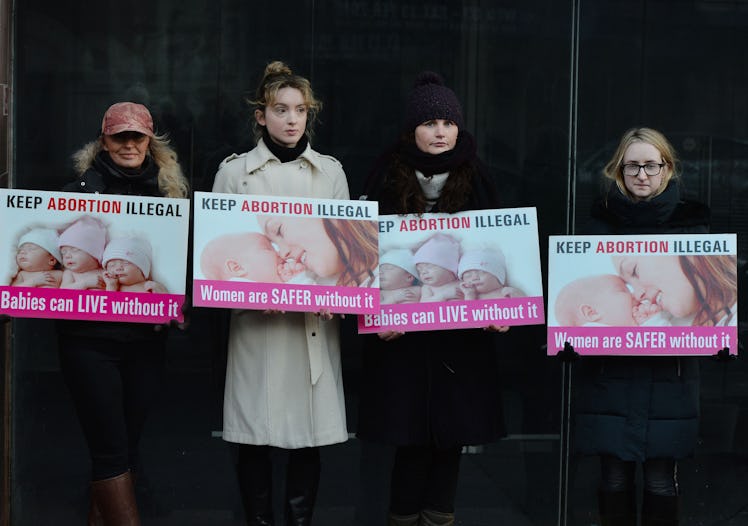
Alabama Is Allowing A Man To Sue An Abortion Clinic Over His Ex-Girlfriend's Abortion
A single case in Alabama could have major influence on the future on reproductive rights. In a case that's being described as the "first of its kind," an Alabama man is suing an abortion clinic on behalf of an aborted fetus after his teenage girlfriend decided to terminate her pregnancy. According to The Washington Post, an Alabama judge has allowed the boyfriend to go after the manufacturer of the abortion pill she used, as well as the clinic that gave it to her, thereby recognizing an unborn fetus as having rights under the law.
On Feb. 6, Ryan Magers filed a lawsuit against the Alabama Women's Center for Reproductive Alternatives, LLC, after they had provided his then-girlfriend abortion medications back in 2017, according to The Hill. Elite Daily reached out to the Alabama Women's Center for Reproductive Alternatives for comment on the suit, but did not immediately hear back. Per the court filings obtained by The Washington Post, upon finding out his then-girlfriend was pregnant, Magers "repeatedly pleaded" with her to have the baby, but she wanted an abortion and went through with it six weeks into her pregnancy. "I'm here for the men who actually want to have their baby," Magers told local news station WATV in February.
On Tuesday, March 5, Madison County Probate Judge Frank Barger issued a decree stating that the fetus, which he called "Baby Roe," is considered a person, per The Washington Post, and therefore ruled that Magers is within his rights to name the aborted fetus as a co-plaintiff in his "wrongful death" lawsuit. Elite Daily reached out to Barger for additional comment, but did not immediately hear back. Barger's decision was made possible under Alabama's "personhood" amendment, which passed in November 2018 and gives constitutional rights to fertilized eggs and fetuses, according to Rolling Stone. It also strips away any legal rights to an abortion under Alabama state law. However, federal law, which currently guarantees the right to an abortion, supersedes the state law.
The case is raising alarm from abortion rights advocates, who are concerned that the case could set a precedent for putting the rights of fathers and fetuses ahead of the rights of pregnant individuals. Following Barger's decree, President of NARAL Pro-Choice America Ilyse Hogue called the case "very scary" on Twitter because it "[asserts] woman's rights third in line."
Adrienne Kimmell, the vice president of NARAL Pro-Choice America, echoed a similar sentiment as her colleague. In a statement to Elite Daily, Kimmell called the Alabama case "chilling." She said,
The case in Alabama is chilling because it represents the real-life consequences of anti-choice ‘personhood’ policies, which, by design, seek to demote the fundamental rights of women, and are a stepping stone in the anti-choice movement’s ultimate goal of criminalizing abortion and punishing women. To see it playing out in this case in Alabama should serve as a grave warning sign.
However, the case could contrast standing precedent. Lucinda Finley, a law professor at the University of Buffalo specializing in reproductive rights and equal protection law, told The Cut that 1992's Supreme Court ruling in Planned Parenthood v. Casey stripped state laws that would require a pregnant women to get consent for an abortion "or even inform" her partner of the child or her plans. Finley pointed out that while Alabama allows wrongful death lawsuits involving a fetus, the death must be caused by a "legally wrongful act." However, because Magers' girlfriend consented to terminating her pregnancy, the clinic likely "did not perform any wrongful act."
As of March 7, there are three states, including Alabama, that have a "personhood" law, but there's an active "personhood" movement to some degree in every state, according to Rewire News. Troublingly, the laws may amplify an already existing trend in which miscarriages or accidents may be treated criminally, according to The New York Times.
It's possible that this Alabama case can be a one-off, but with the latest ruling and growing personhood movement, there could be major changes to the reproductive rights we know.